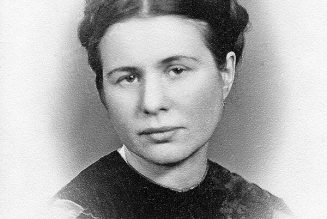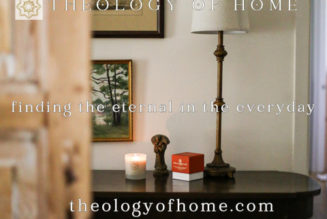
Recently a dear friend of mine approached me at a parish event, laughingly saying she had just done something completely funny — and also completely embarrassing. This particular friend does indeed have a fabulous sense of humor and we’re always laughing together, so I leaned in to hear the story.
It turns out that just moments before, she had been introduced to a couple she’d never met before. When the gentleman told her he worked at the “AI,” which (almost) all Catholics here in Denver know stands for the Augustine Institute (a theological school here in town), my friend’s eyes grew wide as she enthused to him about how very cool that was.
Being unfamiliar with the college, she thought he meant he worked with robots. As in, artificial intelligence. Thankfully she didn’t say any more and, somehow, eventually discerned that he did not, in fact, work in the artificial intelligence industry. And yes, we had a delightfully good laugh about it. Though no doubt he walked away feeling like, finally, someone was properly impressed with his job in academia!
Not a week later, I was at a party in a friend’s backyard, where I was introduced to someone who I thought was a deacon. (It’s a long story why I thought that, but I assure you it was not without good reason!)
“How long have you been a deacon?” I asked, thinking I was taking an interest in this person and proud of my introverted self for doing so. Imagine my surprise, then, when he replied, “I’m not a deacon, and I’ve never been a deacon.”
I explained why I’d mistakenly thought that, and he was of course very nice, but I’m sure that deep down he thought I was crazy and socially awkward because, really, who does that? Who strikes up a conversation at a party by asking random people how long they’ve been a deacon?
I do, apparently.
As silly and, yes, cringeworthy as these stories are, they do reflect the delightfully uncomfortable reality that friendship and human connection necessitate some amount of vulnerability. People are messy and unpredictable; thus our social encounters will naturally reflect this reality as well. Conversations do not follow a script — oh, how I wish they did! — and it’s not just the notorious awkward pause we have to worry about. There may also be awkward words.
Maybe, dear reader, you are nothing like my friend and me. Maybe you always sound polished and put-together and know all the right things to say, and you know all the references to all the things, and you’re shaking your head in disbelief over the robot and the deacon. Maybe you have never enthusiastically agreed to join an editorial meeting at a publishing house — a meeting you were invited to entirely by accident, which became clear when you were subtly removed from the conversation. (A truly great story for another time.) But surely there are others out there, people who also regularly find themselves reflecting that, wow, people must think I’m a complete nut. And I guess the older I get, the more I think that’s all really kind of okay.
Because it means, at root, that I’m out there. I’m alive. I’m meeting and engaging and connecting. I’m participating, for better or worse, in the greater community. Sometimes that means that I’ll have interesting, stimulating and lovely conversations, and other times I’ll be wishing I could time-travel 10 seconds back to before I asked that man how long he’d been a deacon, or accepted the non-invitation to an inner-circle meeting of publishers. It’s all an adventure, really, in being present and, ultimately, in being human.
I’ve been thinking a lot lately about how the downside of social media and online connection (and don’t get me wrong — there are upsides, too, but this isn’t one of them!) is that it allows for a more or less curated, relatively sterile environment for relationship. You can edit responses, you can select who exactly is part of your tribe, and you can block people. You can walk away completely for days, weeks or months at a time. You can pretend you didn’t just have an epic misunderstanding.
This form of engagement has, for better or worse (and I would argue worse) supplanted the sorts of conversations and community building that, 15 years ago, would have happened in person within your home, neighborhood or parish. And it’s worth asking the question: in gaining the ability to engage with the world, what have we lost much closer to home?
Meanwhile, people have simultaneously lost faith in institutions, in general. And not necessarily without good reason. Who of us hasn’t, after all, been let down at some point by someone or something within our political party or local church community? Who hasn’t felt at some point as if they have been left behind, or are no longer properly represented by a particular institution of which they are a member?
We’ve all been there. But a cultural shift toward the rejection of institutions means that prior sources of community and camaraderie have fallen by the wayside, leaving little but isolation and loneliness in their wake. The former anchors of community — the family, the geographic neighborhood and the local parish — are no longer necessarily quite as relevant in serving as the center or crucible of community. And they no longer need to be, due to the aforementioned online community.
We are, simply, a fragmented people.
To my mind, the only way to combat this problem is to put down the smartphone and get out there. Be present. Make space in your life for both spontaneous and planned in-person conversation and relationship building. Yes, you will stick your foot in your mouth. Yes, some people (including you) will be socially awkward. Yes, your personal quirks and idiosyncrasies will be on full display and there will be positively nowhere to run and hide when, inevitably, you mistakenly believe a learned Catholic professor manufactures robots for a living.
That is life, relationship and community, in all its painfully beautiful splendor.

![Erdő vs. Tagle: the battle to be the next pope [Catholic Herald paywall]…](https://salvationprosperity.net/wp-content/uploads/2022/08/erdo-vs-tagle-the-battle-to-be-the-next-pope-catholic-herald-paywall-327x219.jpg)







